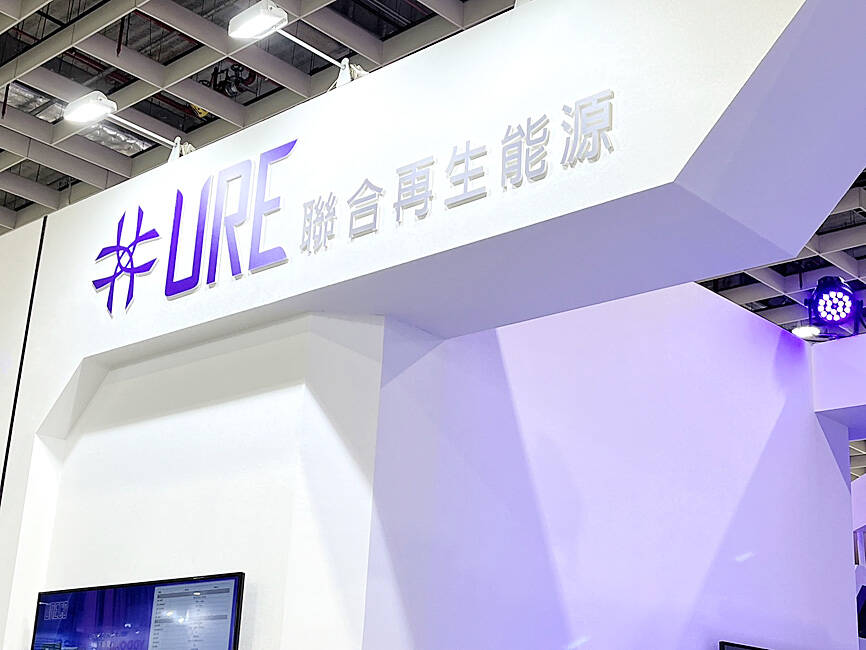Solar module maker United Renewable Energy Co (URE, 聯合再生) forecast shipments would grow next year on a gradual recovery in demand in Taiwan and overseas markets, after solar installation this year fell behind the company’s 2.2-gigawatt (GW) target.
During the first 10 months of this year, about 1.4GW of solar systems were deployed, bringing the total installation to 13.8GW, URE chief financial officer Pan Lay-lay (潘蕾蕾) told a conference yesterday.
As Taiwan needs to set up 6GW solar installations to reach its target of 20GW by the end of 2026, government agencies might speed up paperwork to push for new solar projects, Pan said.

Photo: Chang Hui-wen, Taipei Times
“We are optimistic about our solar product shipments growth next year versus this year,” Pan said.
Still, URE expects solar product prices to remain in a “severe” situation next year, as oversupply in China continues to pressure global solar capacity, she said.
As the US imposed heavy anti-dumping duties on solar cells and modules from Cambodia, Malaysia, Thailand and Vietnam would prevent Chinese companies from getting around the restrictions, URE has decided to shut down its solar cell production line in Thailand and to transform the unit into an energy total solution provider, Pan said.
In the past, the company produced solar cells in Thailand for the US market, she said.
The company also plans to build a new solar module production line next year to produce next-generation TOPCon solar wafers, Pan said.
The production line would have a capacity of 40GW a year, she said.
Meanwhile, URE plans to revamp an existing solar module production line, which has 400GW capacity, to enhance its competitiveness, she added.
The company reported losses of NT$1.92 billion (US$58.8 million) in the first three quarters of this year, compared with losses of NT$1.73 billion a year earlier. Revenue during the first 10 months fell 60 percent to NT$4.19 billion from NT$10.27 billion in the same period last year.

Taiwan Semiconductor Manufacturing Co (TSMC, 台積電) yesterday said that its investment plan in Arizona is going according to schedule, following a local media report claiming that the company is planning to break ground on its third wafer fab in the US in June. In a statement, TSMC said it does not comment on market speculation, but that its investments in Arizona are proceeding well. TSMC is investing more than US$65 billion in Arizona to build three advanced wafer fabs. The first one has started production using the 4-nanometer (nm) process, while the second one would start mass production using the

When an apartment comes up for rent in Germany’s big cities, hundreds of prospective tenants often queue down the street to view it, but the acute shortage of affordable housing is getting scant attention ahead of today’s snap general election. “Housing is one of the main problems for people, but nobody talks about it, nobody takes it seriously,” said Andreas Ibel, president of Build Europe, an association representing housing developers. Migration and the sluggish economy top the list of voters’ concerns, but analysts say housing policy fails to break through as returns on investment take time to register, making the

‘SILVER LINING’: Although the news caused TSMC to fall on the local market, an analyst said that as tariffs are not set to go into effect until April, there is still time for negotiations US President Donald Trump on Tuesday said that he would likely impose tariffs on semiconductor, automobile and pharmaceutical imports of about 25 percent, with an announcement coming as soon as April 2 in a move that would represent a dramatic widening of the US leader’s trade war. “I probably will tell you that on April 2, but it’ll be in the neighborhood of 25 percent,” Trump told reporters at his Mar-a-Lago club when asked about his plan for auto tariffs. Asked about similar levies on pharmaceutical drugs and semiconductors, the president said that “it’ll be 25 percent and higher, and it’ll

CHIP BOOM: Revenue for the semiconductor industry is set to reach US$1 trillion by 2032, opening up opportunities for the chip pacakging and testing company, it said ASE Technology Holding Co (日月光投控), the world’s largest provider of outsourced semiconductor assembly and test (OSAT) services, yesterday launched a new advanced manufacturing facility in Penang, Malaysia, aiming to meet growing demand for emerging technologies such as generative artificial intelligence (AI) applications. The US$300 million facility is a critical step in expanding ASE’s global footprint, offering an alternative for customers from the US, Europe, Japan, South Korea and China to assemble and test chips outside of Taiwan amid efforts to diversify supply chains. The plant, the company’s fifth in Malaysia, is part of a strategic expansion plan that would more than triple